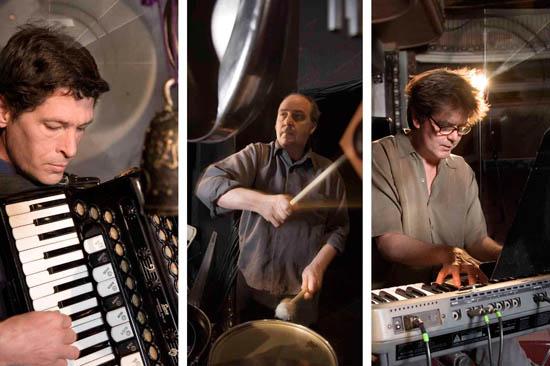
The Alloy Orchestra returns to the Ross Sept. 19
calendar icon08 Sep 2015
Lincoln, Neb.--The Alloy Orchestra returns to The Ross on Saturday, Sept. 19 at 7 p.m. performing their original score to the newly restored 1929 documentary classic MAN WITH A MOVIE CAMERA by Dziga Vertov. Further details are available at www.TheRoss.org, by consulting your newspaper, or by calling the MRRMAC film information line at (402) 472-5353.Called “the best in the world at accompanying silent films,” by Roger Ebert, the Alloy Orchestra is a three man musical ensemble, writing and performing live accompaniment to classic silent films. Working with an outrageous assemblage of peculiar objects, they thrash and grind soulful music from unlikely sources. Performing at prestigious film festivals and cultural centers in the US and abroad, Alloy has helped revive some of the great masterpieces of the silent era. (For more information, please visit their website at www.alloyorchestra.com.)
An unusual combination of found percussion and state-of-the-art electronics gives the Orchestra the ability to create any sound imaginable. Utilizing their famous "rack of junk" and electronic synthesizers, the group generates beautiful music in a spectacular variety of styles. They can conjure up a French symphony or a simple German bar band of the 20's. The group can make the audience think it is being attacked by tigers, contacted by radio signals from Mars or swept up in the Russian Revolution.
This program is being presented with the support of the Nebraska Arts Council and the Nebraska Cultural Endowment.
MAN WITH A MOVIE CAMERA
1929 (USSR) – Directed by Dziga Vertov, 67 min
Soviet director Dziga Vertov's experimental film grew out of his belief, shared by his editor, Elizaveta Svilova (who was also his wife), and his cinematographer, Mikhail Kaufman (also his brother), that the true goal of cinema should be to present life as it is lived. To that end, the filmmakers offer a day-in-the-life portrait of a city from dawn until dusk, though they actually shot their footage in several cities, including Moscow, Kiev, and Odessa. After an opening statement, there are no words in the film (neither voice-over nor titles), just dazzling imagery, kinetically edited - as a celebration of the modern city with a marked emphasis on its buildings and machinery. ~ Tom Wiener, Rovi
Of all the cinematic trailblazers to emerge during the early years of the Soviet Union – Sergei Eisenstein, Vsevolod Pudovkin, Lev Kuleshov – Dziga Vertov (né Denis Arkadievitch Kaufman, 1896–1954) was the most radical.
Whereas Eisenstein – as seen in that film school standard Battleship Potemkin – used montage editing to create new ways of telling a story, Vertov dispensed with story altogether. He loathed fiction films. “The film drama is the Opium of the people,” he wrote. “Down with Bourgeois fairy-tale scenarios…long live life as it is!” He called for the creation of a new kind of cinema free of the counter-revolutionary baggage of Western movies. A cinema that captured real life.
At the beginning of his masterpiece, MAN WITH A MOVIE CAMERA (1929) – which was named in 2012 by Sight and Sound magazine as the 8th best movie ever made – Vertov announced exactly what that kind of cinema would look like: "This film is an experiment in cinematic communication of real events without the help of intertitles, without the help of a story, without the help of theatre. This experimental work aims at creating a truly international language of cinema based on its absolute separation from the language of theatre and literature."
Now see MOVIE CAMERA in a magnificent new restoration (with Alloy’s groundbreaking original score). Fear not, the restoration is new, but the score is Alloy’s beloved 1995 score, derived from the directors notes to his composer for the premiere of the film in 1929.